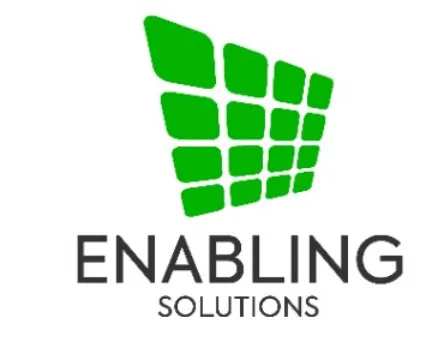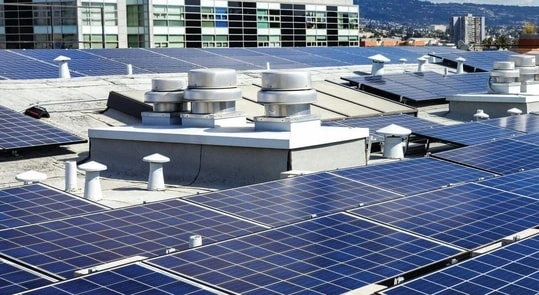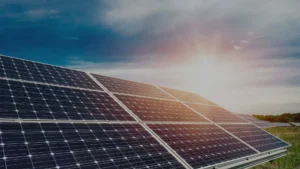This article serves as a comprehensive guide to the rise of solar panels for commercial use, including the benefits, cost savings, and environmental impact. In recent years, there has been a growing trend towards renewable energy sources in commercial spaces. One of the most popular forms of renewable energy is solar power, which has been increasingly adopted by businesses of all sizes.
Enabling Solutions is ready to enlighten your business with the installation of solar system. Enabling Solutions is providing best solar panels for commercial use in all over the Pakistan. Over many years, the company has delivered many successful projects and earn customer’s trust and satisfaction. To visit out office or to contact, kindly click here.
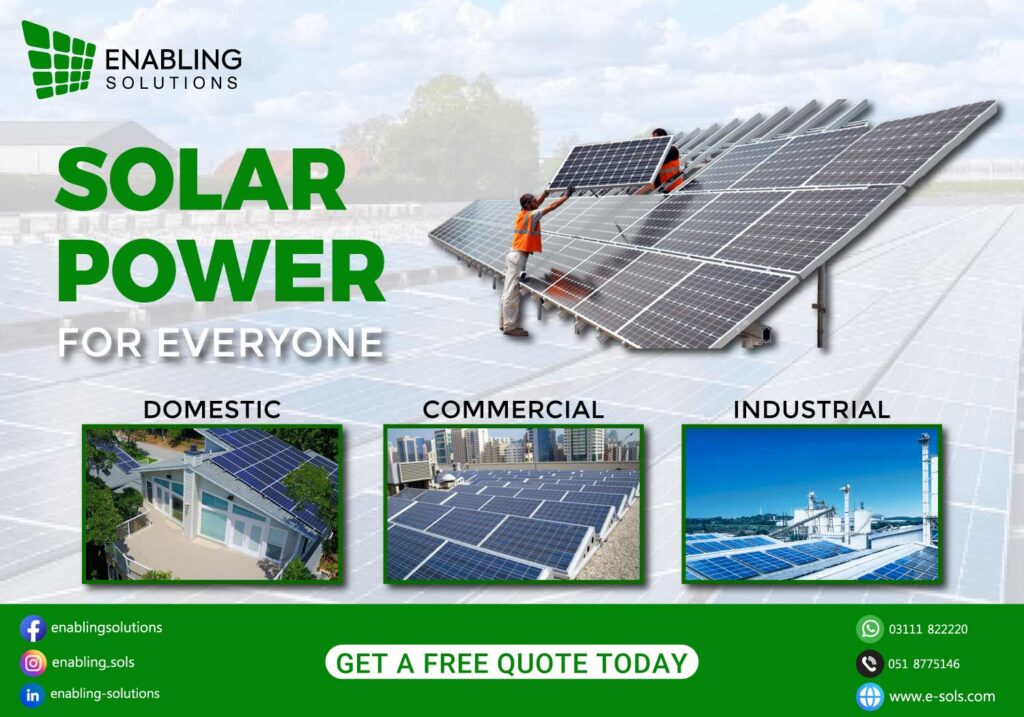
The Growing Trend towards Renewable Energy
As the world continues to become more environmentally conscious, the trend towards renewable energy has grown exponentially. Solar panels for commercial use is one of the most popular forms of renewable energy, with more and more businesses looking to adopt solar panels for their commercial properties.
Benefits of Solar Panels for Commercial Use
There are numerous benefits to adopting solar panels for commercial use. One of the biggest benefits is the significant cost savings they can provide. Additionally, solar panels can allow businesses to reduce their environmental impact and take responsibility for their corporate sustainability.
Cost Savings and Return on Investment
One of the biggest draws for businesses to adopt solar panels is the cost savings they provide. A solar panel system requires an initial investment but has a quick payoff period with energy savings. The return on investment can often be as little as 3-5 years.
Environmental Impact and Corporate Social Responsibility
In addition to the financial benefits of solar panels, businesses can significantly reduce their environmental impact by adopting renewable energy. By becoming more sustainable, businesses can also take responsibility for their corporate social responsibility.
Understanding Solar Panels
Before adopting solar panels for commercial use, it’s important to understand how they work and the different types available.
How Solar Panels Work
Solar panels convert sunlight into electricity by using photovoltaic technology. This technology allows solar cells to absorb sunlight and convert it into a direct current (DC) of electricity, then the inverter switches it to alternating current (AC) for use in your building.
Types of Solar Panels for Commercial Use
There are three main types of solar panels used for commercial use: monocrystalline, polycrystalline, and thin-film. Each type has advantages and disadvantages that may suit different situations.
- Monocrystalline
Monocrystalline solar panels are made from a single, high-grade silicon crystal making them the most efficient and reliable type of solar panels commercially available.
- Polycrystalline
Polycrystalline solar panels are made up of multiple silicon crystals formed together. They are less expensive than monocrystalline and are also less efficient.
- Thin-Film
Thin-film solar panels are made up of layers of thin films, making them more lightweight and flexible than other types of solar panels. They are also less efficient and generally require more square footage per watt.
Solar Panel Efficiency and Performance
The efficiency of solar panels refers to the amount of sunlight they can convert into usable energy. A higher efficiency rating means more sunlight is being absorbed and converted into electricity.
Factors Affecting Solar Panel Performance
There are several factors that can impact the performance of solar panels, including weather conditions, orientation and tilt, and shading and obstructions.
Evaluating the Viability of Installing Solar Panels
Before investing in a solar panel system, it’s important to evaluate the viability of installing solar panels on your commercial property. This process should include a site assessment to understand how much sunlight is available, roof space available for installation, and any obstructions that could impact performance.
Choosing Your Solar Panel System
Once you’ve decided to move forward with solar panels for commercial use, it’s important to choose the right system.
Sizing Your Solar Panel System
The size of your solar panel system will depend on a variety of factors, including energy requirements, peak power demand, and available roof space.
Deciding on a Solar Panel Manufacturer and Installer
Choosing the right solar panel manufacturer and installer can be critical to the success of your solar panel system. Factors to consider include the quality of the solar panels, warranty and maintenance, expertise of the installer, and financing options.
Financing Your Solar Panel System
Solar panel systems require an initial investment, but there are several financing options available including purchasing, leasing, and incentive programs.
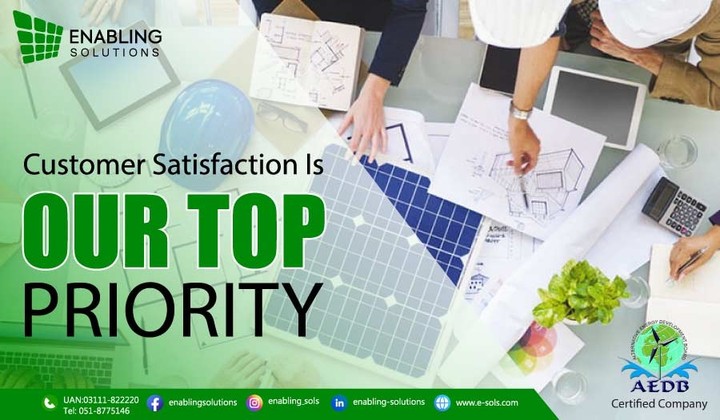
Installing Your Solar Panel System
Installing solar panels for commercial use requires a bit of preparation and work, but the process is fairly straightforward.
Site Assessment and Preparation
Before installation, it’s important to assess and prepare your site. A structural integrity assessment of the roof, electrical infrastructure, and wiring should be considered.
Wiring and Mounting Your Solar Panels
Wiring and mounting your solar panels should be carefully planned to ensure the panels are secure and functioning properly.
Inspections and Testing
After installation, the solar panel system should be inspected and tested to ensure it’s up to code and functioning properly.
Maximizing the Benefits of Your Solar Panel System
Proper maintenance and utilization can help businesses maximize the benefits of their solar panel systems.
Addressing Disruptions in Performance
Regular monitoring and maintenance of solar panels can help businesses address performance disruptions.
Solar Panel Maintenance and Upkeep
Cleaning and replacing damaged panels or components should be considered as a part of regular maintenance for solar panel systems.
Upgrading Your System
Upgrading solar panel systems can improve energy efficiency and reduce maintenance costs over time.
Solar Panels for Commercial Use
Now, it is essential to know that which sectors are in dire need of solar panels. Solar panels offer tremendous benefits to various sectors in commercial areas. From retail and shopping centers to office buildings, hotels, industrial complexes, and educational institutions, the integration of solar power can yield significant advantages. here are the following:
Retail and Shopping Centers:
Solar installations at retail establishments and shopping centers make ideal candidates for solar panel installations, since many roof spaces can support multiple solar panels for commercial use. By harnessing the sun’s power to generate clean and renewable energy, retail businesses can meet some of their electricity requirements with renewable sources like the sun’s energy, saving on operating costs while simultaneously supporting sustainability efforts.
Office Buildings
Office buildings can use significant amounts of energy for lighting, air conditioning, and running office equipment. Installing solar panels on their rooftops or facades can generate electricity on-site to offset building energy consumption while decreasing dependence on grid electricity. Furthermore, solar panels for commercial use make office buildings more energy efficient, thereby making them more desirable to environmentally conscious tenants as well as increasing their market value.
Hotel and Hospitality Industry
Hotels can take great advantage of solar panel installations to power guest rooms, common areas, and facilities while meeting energy demands from guests and facilities. Many hotels boast expansive rooftops, providing ample room for solar arrays. By embracing solar energy solutions, hotels can reduce operational costs, promote sustainability initiatives, and appeal to eco-minded guests looking for accommodations that emphasize eco-friendliness.
Industrial Complexes
Industries like manufacturing facilities and warehouses often have considerable energy demands, which necessitate reliable yet cost-effective sources of power such as solar. Integrating solar panels into their infrastructure can provide reliable yet cost-effective energy that offsets heavy machinery’s energy consumption as well as lighting needs and other operational necessities. Furthermore, solar panels for commercial use can contribute to resilience within an industrial complex by serving as a backup power source during grid outages or emergencies.
Educational Institutions:
Schools, colleges, and universities can greatly benefit from adopting solar energy. Schools typically feature spacious rooftops that can support large solar installations; furthermore, solar panels help educational institutions not only reduce their carbon footprint but also serve as learning platforms where students can gain an introduction to renewable energy technologies and sustainable practices.
Solar Panels for Commercial Use FAQS
What does Enabling Solutions do?
How Solar panels are beneficial for commercial and industrial users?
Which sectors come under commercial users?
Conclusion
The rise of solar panels for commercial use has numerous benefits for businesses of all sizes. As renewable energy becomes more important, it’s likely that more and more businesses will continue to adopt solar panels as a way to reduce costs and their environmental impact. Those companies who have installed solar panels are getting maximum energy and saving bills. Moreover, it is also beneficial for the environment.
By embracing solar energy, these sectors can enhance their sustainability efforts, reduce operational costs, and contribute to a greener future. The time has come for commercial areas to harness the power of the sun and pave the way towards a more sustainable and resilient future.
